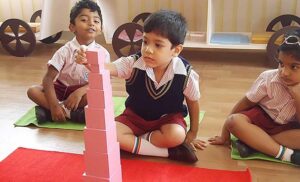Download our FREE Academic Calendar now! 📚 Start your child’s journey to success.
Do you ever wonder how you can make your students curious? Encouraging students’ curiosity is not enough to ask questions; we need strategies that will ignite their desire for knowledge.
Curiosity is a vital catalyst for academic achievement and personal growth. When nurtured, it drives deeper understanding and increases engagement across all disciplines. As such, it has been found through studies that curiosity along with intelligence and effort can greatly affect learning outcomes in terms of grades or scores attained.
Want some ideas on how best to develop this essential quality among your learners? Read on as we discuss evidence-based methods applicable in real-world settings.
Igniting Curiosity in the Learning Process
ImportanceImportanceTo spark curiosity among students, one must create an atmosphere where they are encouraged to explore and ask questions. Here is what you can do:
Promote Inquiry
At international curriculum schools in Noida, teachers emphasise inquiry-based learning. This method involves encouraging students to ask questions about the subject matter being taught and then finding answers through research or experiments.
Projects could be given which require learners to investigate various aspects of a topic; this engages their minds actively as well as critical thinking skills since they have to analyse data collected before arriving at conclusions based on factual evidence obtained from reliable sources only.
Show Enthusiasm
Teachers’ passion for the subjects they teach can infectiously spread into the classroom creating an environment conducive for discovery. If a teacher loves history, he/she may tell stories dramatically while describing ancient civilizations which will captivate learners’ attention making them want more information about the past hence increasing comprehension levels too.
This approach also helps foster positive attitudes towards learning because when students see how much fun their teachers derive from teaching different things, they become interested in themselves even if initially disinterested. Thus developing life-long curiosity necessary for successful completion of formal education system stages.
Interactive Discussions
When teachers engage students in interactive discussions, it deepens understanding and cultivates curiosity. For example, during a lesson on global warming, the instructor can prompt learners to look at different angles of the problem such as its causes, effects on ecosystems worldwide and socio-economic implications among others.
This method enables them to think critically about what they are taught thereby giving room for expression of opinions based on personal beliefs or values held so far.
It is through these kinds of conversations that individuals learn how best to disagree respectfully while still appreciating other people’s perspectives which may not be similar with theirs at all but equally valid.
Curiosity Enhances Class Teamwork
Curiosity is a powerful driver for effective teamwork in the classroom. When students are genuinely interested in a topic, they naturally collaborate more intensively, sharing ideas and building on each other’s insights.
This collaboration can be seen in group projects where curious students might explore different solutions to a problem, experiment with new methods, or collectively seek out additional information.
Furthermore, working in teams on engaging projects makes learning more enjoyable, which can further fuel students’ curiosity and drive to learn.
Embrace Spontaneous Exploration
Encouraging spontaneous exploration can lead to significant learning opportunities:
- Allow time for students to pursue their interests within the curriculum.
- Set up learning stations with various activities related to the lesson.
- Encourage students to ask “what if” questions and explore alternative outcomes.
Adding an element of choice and control can greatly enhance students’ engagement and motivation. By allowing them to steer their learning journey, even partially, students feel more invested in the activity. This autonomy not only boosts their confidence but also enhances their creative thinking skills.
Final Thoughts
Fostering curiosity isn’t just about enhancing academic performance; it’s about preparing students for a lifetime of learning and discovery. GIIS Noida is committed to encouraging students’ curiosity through educational practices that prepare them for the challenges of tomorrow.
Explore how we make this possible by visiting our campus or reaching out for more information. Embrace the journey of curiosity with us, and watch as your child or student transforms into a lifelong learner and inquisitive thinker.
Also Read: The Impact of Moral Values on Student Success: Building a Foundation for Lifelong Learning

 Noida Campus
Noida Campus
































FAQs
1. How can teachers make students more curious?
Teachers play an important role in making students curious for learning. Curiosity isn’t just about asking questions but also to encourage students to develop lasting love for learning. Moreover, curiosity also accelerates the personal growth and academic achievement of students in the top international high schools.
Teachers can promote inquiry to make students curious about the subject. Additionally, they can use interactive discussions with the students to engage them in hands-on activities for curiosity. Integrating the advanced technologies and visual aids in learning also make the students curious to discover the new concepts. Curiosity also helps students to become independent learners for their holistic growth.
2. How does curiosity help students learn better?
Curiosity makes students more eager and excited to explore new possibilities and interests in learning. When students are curious to find new things, they engage deeply with the subjects to gain its deeper understanding. The active involvement of students helps them retain information and to discover the why and how behind the concepts.
Many international Montessori schools encourage students to use available resources and engage in independent thinking. This develops a growth mindset in students to handle all situations with their knowledge, value, skills and experiences. As students develop the confidence and encouragement to learn, they learn better for desired outcomes.
3. How can technology boost student curiosity?
Technology brings a wealth of online resources, knowledge base and platforms to cater to the different learning needs and styles. Using the advanced technologies for learning provides hands-on experience to students to develop a deeper understanding. Moreover, the integration of technology in the international curriculum schools in Noida makes learning more engaging and interesting.
Students can learn and grow their interests beyond classroom learning to develop a long-lasting love for learning. Technology also enables students to collaborate with global students to learn from their educational activities. Technology opens endless opportunities for the students to satisfy their curiosity by exploring and learning new concepts.
4. How can parents encourage curiosity at home?
The role of parents isn’t just limited to securing playschool admission for their children. Rather parents should get actively involved to encourage curiosity in their children at home for their progressive growth. Parents should create and offer an environment that supports exploring and questioning new facts.
Parents can show enthusiasm and appreciation towards the natural curiosity of the children. This encourages the students to have open discussion and interactive sessions with their parents to make new discoveries every now and then. Parents should also show their interest in their child’s learning and educational journey to reinforce the importance of curiosity. This also cultivates a love for learning in the children.
5. What are the benefits of inquiry-based learning?
Inquiry-based learning encourages students to ask more questions and then learn through research and experiments. Using the method, the teacher supports the curious thoughts of the students to make them investigate various aspects of a topic. This engages the mind of the students to gather and understand more and more information about that topic.
The best schools in Noida for nursery admission also prioritises the inquiry-based method to develop the student’s interest in learning. Inquiry-based learning also develops teamwork and social skills in students to support their holistic growth. It encourages the students to learn more details about the topics of their interests and likes. The method also ensures a deeper and more lasting understanding of the concepts.